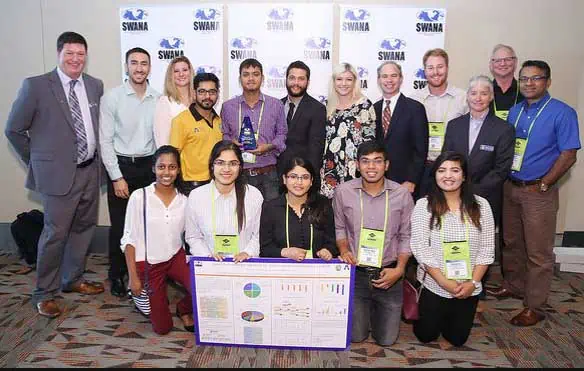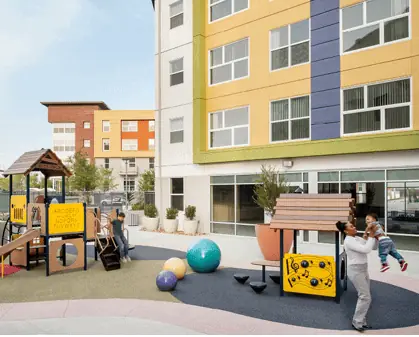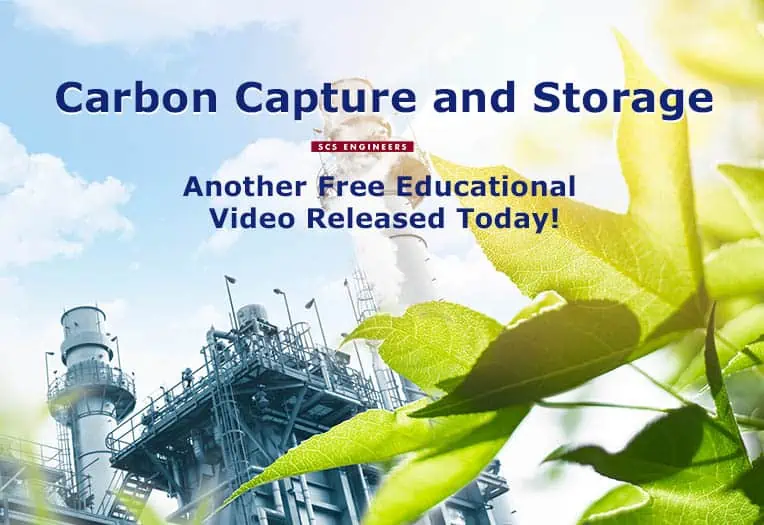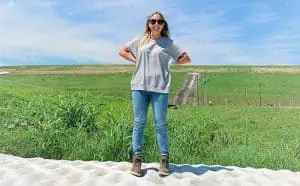

Most seasoned professionals understand that industry organizations can be impactful in providing opportunities for continued education, business development, networking, and personal and professional growth. Here’s one young professional’s story at an environmental firm that shows the value participation in industry associations and organizations brings to careers.
Leading the way
Mateja Vidovic Klanac, Project Professional in SCS’s West Palm Beach, Florida, office, is a perfect case study of the steps needed to gain industry knowledge and immerse yourself in your career.
After working in the air quality sector for two years in Croatia, Mateja came to the United States and joined a research team led by Dr. Daniel Meeroff at Florida Atlantic University. She was investigating effective odor control strategies to assist landfill site personnel in managing daily operations based on the weather conditions.
With this exposure, she developed a keen interest in the solid waste industry and shifted her focus away from air quality. Mateja says, “It was important for me to expand my experience and connect with other professionals in the industry to broaden my horizons.”
“I had never considered working in the solid waste arena before, but that’s when I discovered how interesting and interdisciplinary it is — where my work could positively impact the environment and my community the most.”
She sought a position as president of the joint chapter of a multidisciplinary group which included the Florida Water Environment Association (FWEA), American Water Works Association (AWWA), Solid Waste Association of North America (SWANA), and Air & Waste Management Association (A&WMA) to learn more about solid waste, network, learn, and grow her professional career. During her time as president of the chapter, this joint association at Florida Atlantic University became a more active organization with a mission to promote interest in the environment and the industry.
When Mateja joined SCS Engineers, she was pleasantly surprised to learn that the company supported and encouraged her involvement in these organizations. “SCS sees the value in my leadership position at SWANA. They support my career and learning goals, but it also aids in recruiting and promoting our company culture as we support young professionals looking to learn and contribute.”

SWANA Student YP Design Contest
Mateja is also a member of the SWANA Young Professionals (YP) Steering Committee and has been the chair of the SWANA YP International Solid Waste Design Competition for several years. The SWANA Design Competition offers students opportunities to work on real-world waste management challenges in a supportive and fun environment. The competition strives to prepare students for similar issues they may encounter after graduation working as engineers or solid waste professionals.
Mateja’s leadership has inspired young professionals to become more involved in solid waste engineering and even moved graduating students to apply for open positions at SCS and become part of the team. “Being involved in SWANA provided a pathway for sharing ideas and challenges with other professionals in the industry while providing students with an opportunity to display their talents and establish a premier networking event where they can connect with potential employers.”
Mentorship
She has also inspired a colleague, Alex Stege, a Senior Project Advisor and 33-year veteran of SCS. He has volunteered his time alongside Mateja for the past two years. “Mateja asked me to assist with the YP design contests because it was specific to my area of expertise; landfill gas (LFG) modeling. I have been leading the SCS non-regulatory LFG modeling practice for over 25 years.”
Alex was critical to the competition because he helped participants understand different methods for estimating LFG generation and emissions. He suggested they evaluate LandGEM and the alternative LFG models derived from their academic research using site-specific waste disposal and LFG recovery data.
Mateja is grateful for his involvement. “Last year, the topic was evaluating the limitations of EPA’s LandGEM and developing an alternative method for estimating landfill methane emissions,” she says. “We chose the topic because of its importance, occurrence in recent industry news, and relevance to climate change.”
“Recognizing this subject matter required Alex’s expertise, I reached out, and he was more than willing to help on the technical side to develop the problem statement and serve as one of the judges. I appreciate the time and effort that Alex contributed to the success of this event.”
Mateja appreciates mentoring others and engaging with colleagues through SWANA. But, more than that, she managed different projects and people to gain exponential leadership experience. For that, the dividends to SCS and Mateja are incredible for the long term.
“She put more work into organizing and directing the design contest events over the past several years than we can appreciate. Besides the meetings and administrative arrangements needed to make the event happen, Mateja developed the design contest problems, including an excellent and timely one this past year,” said Alex.
SCS encourages employees to take on leadership roles if they join a professional organization. The exposure to new ideas, mentor opportunities, and networking is instrumental in growing and sustaining a successful career in engineering – and beyond.
If you want to learn more about the YP program or become more involved in SWANA, contact Mateja or visit Young Professionals (swana.org).
Additional Resources for YPs:
COMM22, a master-planned, mixed-use development project on a former brownfield, receives the 2023 Phoenix Award as an outstanding development on a revitalized property. The national premier awards program for brownfield redevelopment reflects the progression of brownfield redevelopment over decades and recognizes extraordinary practitioners and projects such as COMM22.
SCS Engineers will be at EPA’s Brownfields 2023 Conference to accept the award on behalf of the COMM22 team. The COMM22 development is the result of a collaboration between BRIDGE Housing and the Metropolitan Area Advisory Committee on Anti-Poverty (MAAC) in partnership with San Diego’s Unified School District as a public-private partnership.
“The COMM22 team is honored by the Phoenix Award. Many partners are part of transforming this once-underutilized school district site into transit-oriented affordable housing connecting people to jobs and services. I am pleased to thank them all. Our mission at BRIDGE Housing is to strengthen communities and improve the lives of our residents, beginning – but not ending with affordable housing. COMM22 is an excellent example of the collaboration and creativity required to address a housing crisis of the magnitude we are facing. On behalf of BRIDGE and the entire COMM22 team, it is my pleasure to extend our appreciation to the organizers of the Brownfields conference and the Phoenix Award.” said Jeff Williams, director of development for BRIDGE Housing.
The COMM22 team took an abandoned and contaminated property in a mixed residential and commercial neighborhood to create a thriving hub of residences reinvigorating the area and providing stable homes for hundreds of low-income individuals, elders, and families.
Brownfield revitalizations have grown substantially with public, private, and nonprofit practitioners nationwide who depend on brownfields as a strategic function of planning, economic development, environmental quality, and community development. The COMM22 project, for example, provides over 200 affordable housing units, 13,000 square feet of commercial space, a 4,200 square foot child care facility, and 11 affordable for-sale townhomes in San Diego, CA.
The affordable housing units are separated into 70 senior housing units and 130 family housing units. Paseo at COMM22 Family Housing in Logan Heights has 130 apartment units, 13 serving youth eligible for supportive services on a referral basis. The remaining units are available to low-income families and individuals.

Victoria at COMM22 offers 70 affordable housing units for seniors 62 and older. Victoria has 40 studio, one- and two-bedroom apartments with affordable below-market-rate rents and 30-one-bedroom apartments with HUD subsidized rents.
SCS Engineers’ role in supporting the environmental conditions at the site spans over ten years, including environmental assessments, waste characterization, mass grading, and design and implementation of a successful remediation program; thus delivering housing that supports both the social and business goals of the development team and the community.
“The technical issues were challenging, but it’s amazing to see the transformation of vacant lots into vibrant housing that anchor the neighborhood,” says Dan Johnson, SCS Engineers vice president. “We are proud to be able to provide the highest level of environmental and regulatory support for the community.”
The completed COMM22 housing development is a transformational project that has brought tangible benefits to its residents and the entire community. What was once an abandoned, contaminated property is now a thriving cornerstone for the whole neighborhood and a model for transit-oriented infill development and affordable housing with a noticeable increase in the quality of life and a palpable pride of ownership.
Additional Resources
Hear from SCS Engineers professionals at the Utility Solid Waste Activities Group SPCC Workshop, August 29-30, at the Grand Hyatt Washington Hotel in Washington, D.C.
Description: Jared and Spencer will discuss common issues observed while preparing and reviewing SPCC Plans for electric utility facilities. They will include content applicable to different types of facilities (power plants, substations, storage yards), and cover some different types of SPCC activities (inspections, 5-year reviews, secondary containment, etc.).
For more conference details and registration information, click here.
We hope to see you there!

Carbon capture and storage (CCS) enables industry and manufacturing to reduce greenhouse gas footprints by up to 2 million metric tons annually, for decades. It’s a great time to learn how this technology works, how it can help you, and what the overall lifecycle of a CCS project looks like. In this chapter, Kacey Garber and Candy Elliot step through best practices based on project experience, regulations (in this example Illinois), and the compilation and submittal of permit applications. You’ll learn about:
Your business does not have to be in Illinois to learn from these educational, non-commercial webinars. Transform how industry leaders like you manage greenhouse gas as a byproduct of modern life.
Helpful Basic Tips:
Early planning and mindful project scoping are critical for a CCS project to understand and communicate the project’s needs, objectives, goals, and conceptualized design. Use site characterization data and have a good handle on the operational parameters to develop a good first model and initial area of review delineation. The monitoring system design should then be tailored based on those data. Use the baseline and operational monitoring data to calibrate the model and refine your area of review delineation.
Early financial planning is also important and should include long-term operations and monitoring. Spend rates will be variable throughout these projects and highly dependent on the project’s phase.
The site geology is a key factor — we highly recommend conducting a feasibility study before beginning a project to assess the suitability of Class 6 injection at the proposed location. In addition, when the permit process begins, it’s important to front-load the site characterization efforts to minimize the uncertainty surrounding your site suitability.
Proactive stakeholder engagement surrounding your project is more likely to help lead your project to success. Developing outreach plans help open and facilitate lines of communication with stakeholders, regulatory officials, and public and environmental advocate groups.
Use an iterative project approach – permitting is not a cookie-cutter but a site-specific process. Your early and thorough planning steps help create a feedback loop that will go on throughout the project’s life. It enables flexibility in implementing your approach.

The North Carolina Chapter of SWANA (NCSWANA) is hosting its 2023 Fall Conference at The Cherokee Convention Center in Cherokee, NC, October 16-19.
The 1st Annual Garbie Awards will be presented to honor those individuals and organizations who have excelled and enhanced the field of Solid Waste Management in North Carolina.
The planning committee is preparing an engaging agenda of technical sessions, excellent networking opportunities, and a bowling tournament.
Click for more conference details and registration information
We hope to see you there!
Meet Catelyn Scholwinski, SMM Director, and Stephanie Watson, SMM Vice Director, during an hour-long webinar where we’ll chat about how they got to where they’re at today, their advice for young professionals, and their predictions for our industry. Come ready to ask questions and get to know who is leading the SWANA SMM Technical Division!
SWANA has Technical Divisions that focus on specific solutions for the waste industry. Sustainable Materials Management (SMM) is a very important one. The Division has an upcoming event that is a great opportunity for young professionals interested in more sustainable reuse, recycling, and resource management.
SCS’s own Kelli Farmer is SWANA’s SMM Young Professional Representative. If you want to speak with the men and women on SCS’s Sustainable Materials Management teams, please get in touch with us at .
SCS Engineers is leading the charge to sustainable materials management through innovative policies, programs, and infrastructure that increase diversion, reduce contamination, recycle more materials, and manage costs. SCS offers comprehensive services to assist in achieving your SMM goals and reducing your carbon footprint. We offer technical expertise and the financial, regulatory, and educational skills to develop cost-effective and sustainable programs.
Meet Catelyn Scholwinski, SMM Director, and Stephanie Watson, SMM Vice Director, during an hour-long webinar where we’ll chat about how they got to where they’re at today, their advice for YPs, and their predictions for our industry. Come ready to ask questions and get to know who is leading the SWANA SMM Technical Division!
SWANA has Technical Divisions that focus on specific solutions for the waste industry. Sustainable Materials Management (SMM) is a very important one. The Division has an upcoming event that is a great opportunity for young professionals interested in more sustainable reuse, recycling, and resource management.
SCS Engineers is leading the charge to sustainable materials management through innovative policies, programs, and infrastructure that increase diversion, reduce contamination, recycle more materials, and manage costs. SCS offers comprehensive services to assist in achieving your SMM goals and reducing your carbon footprint. We offer technical expertise and the financial, regulatory, and educational skills to develop cost-effective and sustainable programs. SCS’s own Kelli Farmer is SWANA’s SMM Young Professional Representative.
If you are interested in an environmental career that can impact climate change for the good – this is it! Many types of positions are open now.

Engaging With Your Stakeholders and Public Outreach is Part II of our four part video series.
Geologic sequestration can be seen as an incredible public good that reduces greenhouse gas and protects the health and wellness of generations to come, or a local risk. It’s likely you will receive questions and concerns from the public and other stakeholders during your project’s lifecycle. You can use an effective stakeholder engagement plan to help you anticipate and respond to those questions and concerns.
Watch the Geologic Sequestration webinar to learn how to engage your key stakeholders in a supportive, consistent way that demonstrates your commitment to the community and builds trust. Geologic sequestration is an EPA-approved technology companies are exploring to help them reduce their greenhouse gas emissions. In this chapter you’ll learn:
If you’re ready to explore the benefits of geologic sequestration and want to educate the public and stakeholders about the safety and sustainability of Class VI underground injection control wells, watch Richard Southorn’s video to learn more, or contact your local SCS office for a consultation.

Additional Resources:
Meet Carlisle Carroll, a passionate young professional (YP) who joined SCS Engineers as a summer intern in June 2022. Carlisle worked as a part-time intern during her senior year at North Carolina State University, where she graduated with a Bachelor of Science in Civil Engineering in May 2023. After graduation, she joined the Raleigh, NC, team as a full-time Associate Professional. Jasmyn Oliver of SCS’s Mid-Atlantic Team met with Carlisle one-on-one to hear about her experiences with SCS’s Internship Program and the start of her environmental career.
Congratulations, Carlisle, on your first anniversary with SCS! You started with SCS in June 2022 as a summer intern. How did you learn about the SCS’s internship program?
Thank you! My family owns a construction company, and I worked on a few projects during the summer of my junior year. They were the contractors for a county landfill expansion project in North Carolina. One day that summer, I went to a progress meeting with my mom, who is a general contractor, and met two SCSers from the Raleigh office. They said, “You should apply to our internship program. We’d love to have you in Raleigh.” So, I took their advice and applied. I came in and met everybody, and it worked out nicely.
What was your favorite part about being an SCS intern?
My favorite aspect of my internship was learning more about landfill design. I loved transferring my work on the plan sets and details on CAD into the field and seeing the construction happening in real time. So, it was really nice to be a part of something I was specifically interested in within civil engineering that I couldn’t get a lot of knowledge or experience in throughout college.
Now that you are full-time, can you talk about your responsibilities?
As an Associate Professional, I assist the Raleigh, NC, office with landfill engineering and design projects. I conduct site visits, provide project assistance, and design work in Civil3D. Most of my work involves acting as the county’s inspector, providing Construction Quality Assurance (CQA) to ensure everything’s going smoothly from the start of a project. I think it’s easy for people starting their careers to get comfortable behind their desk and their CAD work. As a young engineer, I believe that going beyond the screen and gaining on-site experience is especially important.
What inspired you to pursue an environmental career in civil engineering, specifically solid waste and landfill design?
My family started their construction company in 1965. And back then, there were hardly any women working in construction. I grew up watching my Nana and my mom, a general contractor, growing in the field. They’re definitely the reason I got into civil engineering and are my biggest role models. My interest in the solid waste industry and landfill design stems from my experience working with them on landfill projects at their construction company.
How would you describe SCS’s culture in three words?
Inclusive – I think working at a company with a strong female presence is awesome. I am very interested in promoting opportunities for females to enter STEM careers, which I’m incredibly passionate about. At SCS, I’ve interacted with many different types of people from different backgrounds and careers, and I appreciate that.
Supportive – Everyone here cares about your success and will give you the support to help you achieve your individual goals and how you picture your perfect career. As a young professional, SCS has a lot of resources and tools to help you grow exponentially from the start of your career.
Versatile – I get the feel of being in a small office where I have those personal connections with everyone and get one-on-one guidance and mentorship. At the same time, I get the advantage of working on a variety of large projects because SCS is a large company.

Do you feel that your work at SCS has made a difference to our environment?
I play a crucial role in assisting our engineers, who positively impact the environment. Time under tension is what makes an impact. Now that I am full-time, I am going to have more opportunities to continue making a positive impact on the environment.
What is the coolest project you’ve worked on?
I am providing CQA for one of our landfill clients on an exposed geomembrane cover project. The landfill will eventually reopen this area and remove the exposed geomembrane cover. They chose to do this project based on an odor study and to address community concerns. I think it’s great that a project like this gives the community what they need and want.
What advice would you give to future interns and YPs at SCS?
This sounds so cliché, but I’d tell them to ask all the questions. It’s been the most important thing. As an intern, it lets them know you’re passionate and want to be involved. You want to use the internship to do what its purpose is, which is to learn and grow.
What are you looking forward to while at SCS?
Once I get settled in, I want to get more involved in things like our young professionals’ group and take up outreach opportunities to get more females involved in the industry. But I’m also geared up to work on big projects!
Our clients and SCSers are excited to have Carlisle, another amazing YP, join SCS Engineers as an Associate Professional!
SCS Project Director, Kenton Yang, PE, shared his enthusiasm for Carlisle joining the Raleigh team,
“We were excited that Carlisle joined us as an intern and felt the program was a success for her and SCS Engineers. Her proactive interest in joining us part-time and now full-time was impressive, and we are fortunate to have her at SCS. I hope it’s the beginning of recruiting the best and brightest from NC State!”
Join SCS Engineers
If you are interested in the internship program for the 2024 summer, please visit SCS’s Careers page from September 2023 through January 2024 to apply.
Please check our open positions for those interested in a rewarding environmental career as an employee-owner.
Meet SCS Engineers professionals at our BOOTH at the Illinois Public Airports Association’s 2023 Annual Fall Conference, September 24-26, in Galena, Illinois.
The IPAA conference will feature a wide array of informative speakers, and plenty of networking opportunities and chances to speak with stakeholders and decision makers in the airport industry.
For more conference details and registration information, click here